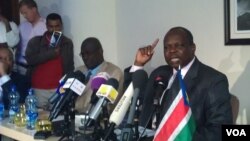South Sudan presented the African Union with a new proposal on Monday for ending its long standing oil dispute with Khartoum.
South Sudan’s Chargé d'Affaires at the United Nations said the deal, if accepted by Khartoum, will normalize relations between the two countries. Ambassador Nazario said his country has made many compromises in order to achieve lasting peace with Sudan.
‘’Sudan [has not agreed] on the map, which has delayed the establishment of a buffer zone and the activation of a monitoring mechanism. But now, with this proposal, we expect Khartoum to accept it,’’ Nazario said.
The ambassador said South Sudan is planning to resume oil production if Sudan accepts transit fees of up to $9.10 per barrel.
Juba is also offering to pay Sudan $8.2 billion to help with monies Khartoum lost after the south became independent.
“As a government, this is the price for peace. We would like to have good neighborly relations. I think that can be a good price to keep peace between the two states,” he said.
The ambassador also stressed that his country is seeking a comprehensive solution for the impasse over Abyei and other contested border areas. He said the question of disputed areas can be addressed within the context of the Abyei protocol, which was part of the 2005 Comprehensive Peace Agreement. The protocol called for a referendum in Abyei to be held at the same time as southern Sudan’s independence referendum in January 2011.
The envoy warned Sudan to accept the offer to avoid a backlash from the United Nations Security Council. The U.N. has set an August 2 deadline for the two countries to resolve all outstanding issues, or face sanctions.
When South Sudan declared its independence from Sudan on July 9, 2011 it took with it some 75 percent of the oil. However, it must flow through Sudan’s pipelines to reach international markets and the Sudans have not been able to reach agreement on sharing the oil wealth.
South Sudan’s Chargé d'Affaires at the United Nations said the deal, if accepted by Khartoum, will normalize relations between the two countries. Ambassador Nazario said his country has made many compromises in order to achieve lasting peace with Sudan.
‘’Sudan [has not agreed] on the map, which has delayed the establishment of a buffer zone and the activation of a monitoring mechanism. But now, with this proposal, we expect Khartoum to accept it,’’ Nazario said.
The ambassador said South Sudan is planning to resume oil production if Sudan accepts transit fees of up to $9.10 per barrel.
Juba is also offering to pay Sudan $8.2 billion to help with monies Khartoum lost after the south became independent.
“As a government, this is the price for peace. We would like to have good neighborly relations. I think that can be a good price to keep peace between the two states,” he said.
The ambassador also stressed that his country is seeking a comprehensive solution for the impasse over Abyei and other contested border areas. He said the question of disputed areas can be addressed within the context of the Abyei protocol, which was part of the 2005 Comprehensive Peace Agreement. The protocol called for a referendum in Abyei to be held at the same time as southern Sudan’s independence referendum in January 2011.
The envoy warned Sudan to accept the offer to avoid a backlash from the United Nations Security Council. The U.N. has set an August 2 deadline for the two countries to resolve all outstanding issues, or face sanctions.
When South Sudan declared its independence from Sudan on July 9, 2011 it took with it some 75 percent of the oil. However, it must flow through Sudan’s pipelines to reach international markets and the Sudans have not been able to reach agreement on sharing the oil wealth.





